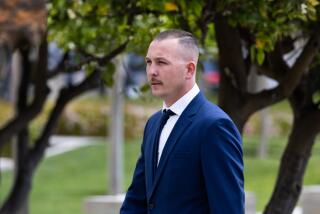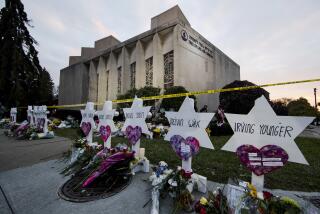Online manifesto linked to Charleston suspect Dylann Roof shows evolving views on race
Reporting from Charleston, S.C. — He uploaded snapshots of himself burning the American flag and holding a Confederate one. He railed about blacks taking over neighborhoods and ruining the country. In a chilling vow, he said he would have to be the one to do something about it.
Dozens of photos and a lengthy manifesto, filled with invective cribbed from white supremacist groups, surfaced Saturday on a website linked to Dylann Roof, the white man charged with killing nine people in a historic black church.
The site, LastRhodesian.com, depicts a young man who grew up without strong opinions on race but later became enthralled with images of the Confederacy and driven by a conviction that he had a duty to help save the white race.
The 2012 shooting death of Trayvon Martin, an unarmed black Florida teenager, apparently marked a turning point for Roof, fueling his obsession with racial issues. The website also reflects the strong influence of a white nationalist group called the Council of Conservative Citizens.
One of the photos shows a seated Roof, wearing camouflage pants and holding an automatic pistol. In another, he stands shirtless, slender and pale, pointing the gun at the camera.
“To take a saying from my favorite film, ‘Even if my life is worth less than a speck of dirt, I want to use it for the good of society,’” said the text on the website, which has been taken down. Roof apparently was referring to the 2011 Japanese movie “Himizu” — the story, according to the film site IMDb, of two youths in post-earthquake Japan who “embark on a campaign of violence against evil-doers.”
The text went on: “We have no skinheads, no real KKK, no one doing anything but talking on the internet. Well someone has to have the bravery to take it to the real world, and I guess that has to be me.”
As a more detailed picture of Roof, 21, emerged, the son of one of the shooting victims said Roof had tried to kill himself as well in the Emanuel AME Church in Charleston on Wednesday night.
“He pointed the gun at his head and pulled the trigger, but it went click,” because the chamber was empty, said Kevin Singleton. His mother, 59-year-old Myra Thompson, was one of those killed.
“His plan was never to leave that church,” Singleton said. Singleton said he and his family were told the story by Polly Sheppard, 69, one of two adult survivors of the massacre. A woman who answered the telephone at Sheppard’s house Saturday refused to comment.
Singleton said that it appeared Roof’s original intent was to kill Emanuel’s well-known minister, the Rev. Clementa Pinckney, who was the first one shot.
But when the Rev. Daniel Simmons, 74 and retired, grappled with Roof, he unloaded on Simmons and the others who died, Singleton said.
Roof is facing nine murder charges in the rampage at one of the oldest and most prominent black churches in the South. According to the charging documents and witness statements, he sat with others in a Bible study group for nearly an hour before taking out a Glock .45 and killing the six women and three men.
An unemployed ninth-grade dropout living in a piney scrub crossroads called Eastover in central South Carolina, Roof reportedly took a recent turn into virulent racism. In a widely circulated Facebook photo, he is wearing a jacket with the flags of apartheid-era South Africa and Rhodesia, the former name of the African nation of Zimbabwe when it was run by a white minority government.
The photo, and most others on LastRhodesian.com, shows Roof with the same bowl haircut and blank expression. He looks happiest outside a Confederate museum. Also included are shots taken inside a cemetery for Confederate soldiers and one close-up of a Glock and seven rounds.
A report from DomainTools.com, which tracks ownership of Internet sites, said the site was registered in February in Roof’s name, using his address in Eastover.
A federal law enforcement official said Saturday that authorities believed the website was genuine but were unsure whether Roof had sole control over it. They are reviewing the matter to determine whether someone assisted him in building and maintaining the site, and whether someone took the photographs for him or if he used a camera timer, the official said.
In the unsigned manifesto, the writer says he was not raised “in a racist home or environment.”
“Growing up, in school, the white and black kids would make racial jokes toward each other, but they were all jokes. … The event that truly awakened me was the Trayvon Martin case.”
After the slaying, the manifesto said, the writer went to the website of the Council of Conservative Citizens and “realized that something was very wrong,” because black-on-white crime was being ignored.
Martin was killed on Feb. 26, 2012, in Sanford, Fla., by George Zimmerman, a former neighborhood watch volunteer who was acquitted of second-degree murder in July 2013 after a racially charged trial.
Richard Cohen, president of the Southern Poverty Law Center, which tracks hate groups, said Saturday that much of the language in the manifesto was material lifted from the CCC, which he called a “modern reincarnation” of the old White Citizens’ Councils that in the 1950s and ‘60s resisted school desegregation in the South.
“The CCC is very active in Roof’s home state of South Carolina,” Cohen said. He added, “It seems the CCC media strategy was successful in recruiting Roof into the radical right.”
He identified the CCC’s webmaster as white nationalist Kyle Rogers, who lives in Summerville, a Charleston suburb. According to a report on the website, the Internet-savvy Rogers trained as a computer engineer and moved to South Carolina in 2004.
The CCC’s website also rails against immigrants in the country illegally, defends the Confederate battle flag flying at the South Carolina Capitol and in 2011 pushed for a boycott of the movie “Thor” because it cast Idris Elba, a black actor, as a Norse god.
Cohen said Rogers had been pushing to bring attention to what he calls black-on-white crime, particularly after the Trayvon Martin shooting.
“It’s a staple of Rogers and the CCC’s media plan,” Cohen said.
Rogers also manages a flag store, which sells the flag of the government of Rhodesia, Cohen said. Attempts to reach Rogers for comment were unsuccessful.
Rogers has lived in a tan brick ranch house on a tree-lined street in Summerville for several years, a neighbor said there Saturday, adding that he mows his own lawn and hosts few visitors.
The neighbor, Herman Bradley, 75, a retired postal worker and Army veteran, said Rogers ran a mail order business out of his home, selling banners and flags.
The text on LastRhodesian.com, which also attacks Jews and Latinos, contains few personal details. It’s mostly filled with arguments about white superiority. Studded with racial epithets and a tone of bitter resentment, it argues that whites — the word is always capitalized — are treated unfairly.
“And who is fighting for him? Who is fighting for these White people forced by economic circumstances to live among negroes? No one, but someone has to.”
It argues that there is still time to save America and the South. “Some people feel as though the South is beyond saving, that we have too many blacks here. To this I say look at history. The South had a higher ratio of blacks when we were holding them as slaves,” the manifesto said.
The writer said he picked Charleston — it doesn’t say for what — “because it is the most historic city in my state, and at one time had the highest ratio of blacks to Whites in the country.”
The writer concludes by apologizing for typos.
“Unfortunately at the time of writing I am in a great hurry and some of my best thoughts, actually many of them have been to be left out and lost forever.”
Tanfani and Phelps reported from Charleston and Serrano reported from Washington. Times staff writer Molly Hennessy-Fiske in Charleston contributed to this report.
More to Read
Sign up for Essential California
The most important California stories and recommendations in your inbox every morning.
You may occasionally receive promotional content from the Los Angeles Times.













